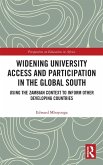Access and participation among the ethnic children of India has remained a great concern. The ethnic groups in India known as the Scheduled Tribes are still lagging behind in terms of education and development. In this study an attempt was made to understand the reasons from the schools as well as the Scheduled Tribe Children about participation in schooling and the learning activities especially of those children who are enrolled in the residential schools created with special provisions for the benefit of these children. Despite all the incentives and facilities being provided in the specially created residential schools, participation of these children in the schooling as well as learning activities is still not satisfactory. This study throws light on the issues related to policy matters governing the Scheduled Tribes and need for stream lining the administration in order to make the delivery system in the schools more efficient.
Bitte wählen Sie Ihr Anliegen aus.
Rechnungen
Retourenschein anfordern
Bestellstatus
Storno








